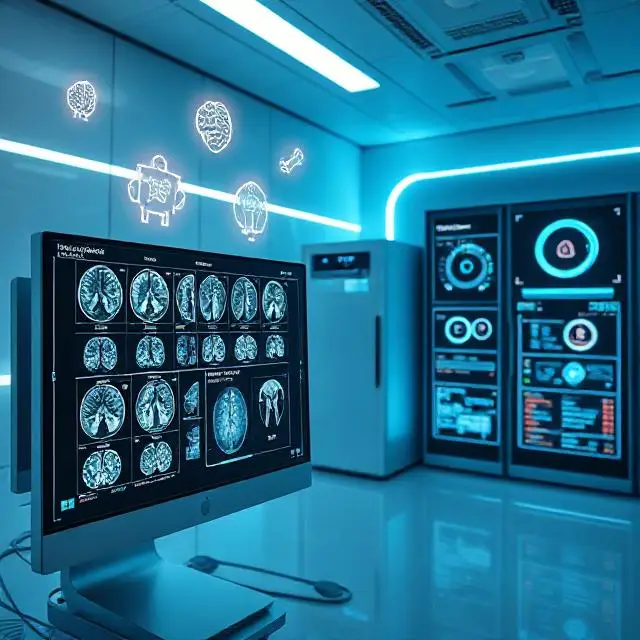In the dynamic world of medical research, the significance of medical imaging data cannot be overstated. This cutting-edge technology has revolutionized healthcare by providing invaluable insights into various medical conditions, enabling more accurate diagnoses, and guiding treatment decisions. There are many applications of medical imaging data in research, and it is important to ensure that all healthcare data receives careful consideration of data governance, goes through proper security processes, and adheres to ethical guidelines.
Medical Imaging Data in Research
Medical imaging data plays a pivotal role in numerous research areas, offering researchers and medical practitioners a wealth of valuable information. Some key fields that heavily rely on medical imaging data include:
- Radiology and Diagnostic Imaging
- Oncology and Cancer Research
- Neurology and Neuroscience
- Artificial Intelligence development
- Cardiology and Cardiovascular Research
- Orthopedics and Musculoskeletal Research
- Pulmonology and Respiratory Research
- Gastroenterology and Digestive System Research
- Radiomics and Machine Learning
- Public Health and Epidemiology
- Medical Device Development
The Role of Medical Imaging in Clinical Trials
Clinical trials are the backbone of medical research, serving as the gateway to new medical treatments and interventions. Medical imaging data can be integrated into clinical trials in various ways:
- Therapeutic Efficacy Assessment
- Safety and Adverse Event Monitoring
- Patient Selection and Stratification
- Biomarker Identification
- Pharmacokinetic Studies
- Validation and Testing of Protocols
- Disease Progression and Long-term Follow-up
Medical imaging data serves as an indispensable asset in medical research and clinical trials, enhancing diagnostic capabilities and guiding treatment decisions. It enables researchers and healthcare professionals to delve deeper into the complexities of various medical conditions and explore new frontiers in personalized medicine. By adhering to strict ethical guidelines and implementing robust data management practices, the future of medical imaging in research is promising.
Data Management in Research
Effective healthcare data management is vital for successful medical research. By implementing best practices in data governance, and security researchers can confidently utilize medical imaging and other healthcare data to make valuable contributions to the field of medicine. Responsible data management ensures patient privacy, data integrity, and fosters a collaborative research environment, ultimately advancing healthcare knowledge and improving patient care.
Data Governance and Ethics:
Researchers must establish clear data access, storage, and usage policies to comply with ethical guidelines and protect patient privacy. Obtaining approvals from IRBs or ethics committees is essential to conduct research ethically and respect patients’ rights and confidentiality.
Data Security and Privacy:
Implement robust security measures, such as encryption and access controls, to protect patient data from unauthorized access or breaches. Prioritizing data security builds trust with patients and the research community.
Anonymization and De-identification:
Before using healthcare data for research, remove or modify identifiable information through anonymization or de-identification to ensure patient privacy while maintaining data integrity. Proper anonymization or de-identification ensures clinical value is retained while protecting PHI.
Data Quality Assurance:
Implement rigorous data quality checks to ensure reliable research findings, enhancing credibility and trust in research outcomes.
Standardization:
Standardize data formats and terminology to promote consistency, data sharing, and collaboration among researchers, improving research efficiency and reproducibility. Standardized data becomes much easier to discover, categorize and interrogate.
Data Documentation:
Comprehensive data documentation ensures reproducibility and facilitates peer review, fostering a collaborative research environment.
Data Storage and Backup:
Choose secure data storage systems and perform regular backups to safeguard research data and ensure continuity.
Data Sharing and Collaboration:
Consider sharing data with other researchers to pool resources and increase statistical power. Collaboration fosters comprehensive exploration of research questions.
Data Retention and Disposal:
Define data retention periods based on regulations and research needs. Protocols for data disposal minimize data exposure risk.
Data Access Controls:
Implement role-based access controls to restrict data access, protecting data integrity and confidentiality.
Data Analytics and Interpretation:
Use appropriate statistical and analytical methods to ensure meaningful conclusions, promoting the validity of research outcomes.
Data Reporting and Publication:
Adhere to established data reporting guidelines in research publications to enhance reproducibility and credibility.
Data Training and Awareness:
Provide data management training to promote a culture of data responsibility and best practices among researchers and staff.
Compliance with Regulations:
Stay informed about relevant data protection regulations, such as HIPAA, to protect patient rights and data integrity.
Medical imaging data plays a pivotal role in medical research, and spans across various fields, guiding research in radiology, oncology, neurology, cardiology, and more. Integrating medical imaging data into clinical trials is vital and enhances therapeutic assessment, safety monitoring, and biomarker identification. However, responsible data management practices are crucial. By upholding patient privacy and data integrity while adhering to regulations, medical imaging data continues to drive medical breakthroughs and improve patient care in the promising future of personalized medicine.








